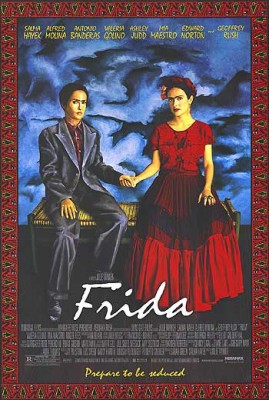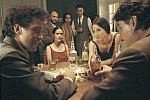| Reviews & Columns |
|
Reviews DVD TV on DVD Blu-ray 4K UHD International DVDs In Theaters Reviews by Studio Video Games Features Collector Series DVDs Easter Egg Database Interviews DVD Talk Radio Feature Articles Columns Anime Talk DVD Savant Horror DVDs The M.O.D. Squad Art House HD Talk Silent DVD
|
DVD Talk Forum |
|
|
| Resources |
|
DVD Price Search Customer Service #'s RCE Info Links |
|
Columns
|
|
|
Frida

Please Note: The images used here are from promotional materials and Aaron Beierle's review of the DVD edition and are not taken from the Blu-ray edition under review.
There is a moment, during an interview at the American Film Institute included as a bonus feature on this Blu-ray edition of Frida, when director Julie Taymor, discussing her then-current film, disdainfully claims that the project's initial script was "a biopic, and I don't do biopics." The implication is that her movie about the life of the renowned Mexican painter Frida Kahlo will be something extraordinary, and that is what I was expecting (the only other Taymor film I've seen being the outlandishly stylized Titus). But I am here to tell you that the lady doth protest too much: Frida is nothing if not a flat, dutiful, desultory biopic, albeit one that boasts a few extra bells and whistles for decoration.
For those unfamiliar, Kahlo (played here by Salma Hayek, also a co-producer) was a posthumously adored and celebrated painter of the first half of the 20th century who was married (very tempestuously) to already-famous Mexican painter/muralist Diego Rivera (Alfred Molina) and whose personal setbacks, including a physically devastating bus accident as a teenager, gave rise to both her ambitions and her themes as a painter. Kahlo's surrealistic, autobiographical (or auto-psychoanalytical) pictures are uncanny, unsettling, strikingly rendered emanations of a vivid, fecund subconscious. That cannot be said of Taymor's picture, which was released in 2002 and which, with 10 years' perspective, has that same bland, mildly "quirky" prestige-picture sheen to it as so much other Miramax Oscar-bait of the period (from Shakespeare in Love to The Shipping News to Chocolat). Taymor's disdain for "the biopic" is almost entirely unearned: Yes, Frida has a sort of insouciantly-executed beyond-the-grave framing device, but it's not nearly as fresh or apt as it felt in, say, Sunset Boulevard, and it does precious little to mask the script's (by Clancy Sigal, Diane Lake, and El Norte auteur Gregory Nava) slavishly linear-chronological biopic timeline, a progression of dramatizations of the best-known, most dynamic, and therefore of course most important and formative events in a famous figure's life, with the emphasis always placed on relationships and personality evolution/"character development," slighting Kahlo and Rivera's passionate and definitive dedication to left-wing politics. Taymor is fully complicit in, if not equally responsible for, this dulling-down, TV-movie-like tendency; a hot and juicy same-sex tango Kahlo undertakes with a bohemian woman is elaborately staged as a Big Moment, scandalizing and titillating us (as it does the surrounding crowd in the scene) as it encapsulates Kahlo's bold sassiness. (Credit is due to Frida's makers for not shying away from her bisexuality or the unconventional sexual terms of her and Rivera's marriage.) But that tango's three minutes of screen time is followed by 10 seconds of Kahlo marching and demonstrating as a communist against fascism. And when Geoffrey Rush makes his star turn as Leon Trotsky later on in the film, his political affinity with Kahlo and Rivera, and the reason for his staying with them (his persecution by Stalin and forced exile from the USSR) are given rudimentary, glancing treatment, with any real dramatic energy and resources (such as they are) reserved for Kahlo and Trotsky's affair.

The other big script problem is the actual dialogue these characters are given, a huge part of which consists of them proclaiming exposition in a way that is sometimes almost insulting, as if the filmmakers assume we're blind or too inattentive to see what's going on. When Frida encounters her elderly father tending her ill mother's garden, for example, a subtle and natural-sounding, perfectly sufficient verbal indicator as to why he's doing so is followed by a blunt, elaborate explanation of the situation that forms the main dialogue-content of the scene. And one seriously doubts that Frida Kahlo and Diego Rivera bantered in the sitcom/meet-cute way they do here, or that they referred to themselves quite so often in terms suggesting they were endlessly filling in an unseen audience on their personalities and behaviors. I have never been anything close to a militant enforcer of the old "show, don't tell" rule of screenwriting (I enjoy Woody Allen's talky movies and love the films of Eric Rohmer and Carl Dreyer's great Gertrud too much for that), but sitting through Frida makes its advisability, as well as the consequences of disregarding it, painfully clear.

The ultimate disappointment of Frida, though, is its failure to be visually captivating. I have fond, if distant, memories of the visual flair that Taymor brought to her debut film, Titus (which I'm now afraid to revisit), so for her film about a visual artist, I had anticipated a much more eye-arresting experience than the one to be found in Frida. It certainly has its moments: A nightmare of the injured, hospital-ridden young Frida is actually a short animated film by The Brothers Quay; jaunts out of Mexico to New York and Paris play out as graphically appealing animated postcards; and Taymor recreates several Kahlo paintings as cinematic tableaux that are pleasing for their tactile, non-CGI solidity and presence. But not only are these maneuvers merely cute and clever, accurately but superficially surveying Kahlo's work with what seems to be little understanding of or appreciation for its emotional profundity and artistic extremity; they're also poorly integrated, serving as mere ornamental, all-too-brief relief from the plodding conventionality of the bulk of the film's style, which is ho-hum in its "dynamic" moments and otherwise comprised of a wide-establishing shot/close-up shot/countershot predictability. This is not "classical" filmmaking as inspired or even fitting creative choice, but as complacent (or even cynical) default/autopilot, and even the lovely play of light and color between the cinematography of Rodrigo Prieto (Amores Perros, Brokeback Mountain, Broken Embraces) and the period-astute and expressive production design of Felipe Fernandez cannot come close to surmounting it.

To cite once again a revealing Taymor confession from the disc's supplements, she defensively insists in several media/interview contexts that Kahlo wasn't a "victim" the way that, according to Taymor's thumbnail reduction, the painter's '80s-era feminist resuscitators saw her, but instead someone who "transcended" the tortuous and rocky path of her life. This is a reductive, practically neoconservative take--a chipper, self-helping postmillennial American's view of the rich, complex, and difficult life and work of an artist into a Rocky story of overcoming adversity to achieve "success." The director also excuses the film's practically negligent avoidance when it comes to depicting Kahlo's actual work--her process, her acts of creation--by claiming, "You can't have a movie where you watch someone paint, making stroke on a canvas; that would be boring." Something like Jacques Rivette's entrancing La Belle noiseuse, which does precisely that, is clearly off Taymor's radar, for all her obvious self-regard as an edgy and sophisticated filmmaker. That brings us to the crux of the problem: Frida's overarching bland-verging-on-insipid feel is actually underscored, not mitigated, by its aura, both from within the film--the incongruous avant-garde montage digressions and the portentous, ungainly score by Elliot Goldenthal being only the most obvious "classy" signifiers--and in the prestige/awards hype that surrounded it. For a film scholar trying to root out a representative specimen of a certain sort of late-90s/early-oughts insular, middlebrow, Oscar-grubbing Indiewood prestige picture, Frida would work beautifully. But as an actual viewing experience, it's a bore, its glimmers of inventiveness only whetting one's appetite for something that never comes.
THE BLU-RAY DISC:
The high-definition, 1080/24p-mastered, AVC/MPEG-4-encoded transfer looks very good; there isn't a visual glitch or flaw attributable to the compression/noise-reducing process that stands out in any way. The film may present an aspect ratio problem, as the theatrical release was 1.85:1 and this edition is presented at 1.78:1, but although that led to what appeared to possibly be some odd (a)symmetries in some of the film's compositions, it ultimately did not present any serious distraction.
Sound:The film's score is an aesthetic problem for the film itself, but the sound quality here is very good, and both it and all of the rest of the film's well-done sound design come through richly dimensional and with great clarity on the disc's DTS-HD Master Audio 5.1 soundtrack.
Extras:--Taymor's feature audio commentary actually reveals her--as do the remainder of the extras--to be an intelligent, nice, briskly professional person, and she does us the service in her commentary of being very revealing about many of the technical decisions and processes that went into Frida, which are always of interest to someone fascinated by film. I cannot give the film itself the compliment of being as interesting as this commentary, unfortunately, but it was nicely enlightening and useful as an inside glimpse into the making of a film, as well as an honest explanation of Taymor's creative process, however strongly one may disagree with her takes on Kahlo, her life, her work, or the best cinematic way to approach them.
--A conversation with Salma Hayek is a 40-minute, in-depth interview with the actress in which she describes the processes of helping to conceive/produce, preparing for, and making Frida.
--A half-hour AFI interview with Julie Taymor from October 2002 again reveals Taymor's simultaneous technical proficiency and her rather sunny/banal, contempory-"affirmative" (and, as it turns out here, very consciously so) emphases when it came to mining Kahlo's story for a supposedly compelling retelling for the big screen.
--A contemporaneous segment from "Now with Bill Moyers", in which Taymor is her same personal and artistic self recognizable from the prior extras, and the great journalist Moyers reveals that he's much better on things like history, politics, sociology, and theology than he is at film appreciation/criticism.
--For a look at the film's musical dimension, the extras also include separate interviews with singers Chavela Vargas and Lila Downs, both of whom provided vocals for key scenes involving music in the film, as well as "Salma's Recording Session," which captures Hayek as she very shyly works up her courage to record a song to be sung by Kahlo in the film.
--"The Vision of Frida: with Rodrigo Prieto and Julie Taymor" is a six-minute interview with the amazing DP incorporating on-set footage of him at work; "The Design of Frida: with Felipe Fernandez" is the same format, but only two minutes, with the film's very talented production designer; and "The Music of Frida: with Elliot Goldenthal and Salma Hayek" is a five-minute interview conducted by the actress with the film's composer/musical coordinator.
--"Bringing Frido Kahlo's Art and Life to Film: A Walk Through the Real Locations" is a five-minute stills montage, narrated by Fernandez, briefly detailing the ways in which both exteriors and interiors were found, constructed, decorated, and/or otherwise modified and manipulated to fit the film's look and period.
--Two segments on the film's "commissioned" visual inserts, "Amoeba Proetus: Visual FX" and "The Brothers Quay: Visual FX,", the former running about 10 minutes and featuring the team that produced the film's "postcard" montages and several other rather ingenious and visually gratifying effects based on Kahlo's works; the latter running about two minutes and featuring brief comments on their collaboration with Taymor from the famous-in-their-own-right fraternal animators/filmmakers.
--Frida: Portrait of an Artist" is somewhat misleadingly labeled; it's just Miramax's 15-minute promotional featurette, and as one might expect, it's the least interesting extra by a significant margin, featuring cast and crew effusing (as in a commercial, which this piece actually is) more than they're discussing anything thoughtfully.
--A gallery of theatrical trailers featuring other Miramax/Lionsgate titles available on Blu-ray.
FINAL THOUGHTS:For both those looking for more exposure to the work and life of painter Frida Kahlo and those seeking after a film that offers anything like the inspired, involving, bold and personal feel to be found in her works (or even any basic insight into the vocation or process of painting), Julie Taymor's Frida is one of the less tenable options. One would be much better off visiting a museum, consulting the large and widely accessible body of Kahlo reproductions, biography, and scholarship, or (if the interest is more in a good cinematic representation of a painter's life and work) getting ahold of Jacques Rivette's La Belle noiseuse or even Ed Harris's Pollock. Taymor and co. have mostly done a disservice to Kahlo, both as biographical person and as artist; their film is really only effective as a cautionary tale about what happens when a rich and fascinating but complex and difficult story requiring nuance, depth, and historical/cultural/aesthetic sophistication in the telling meets the blunt instrument of completely inappropriate conceptions that are simply not up to the task. Taymor has, and permeates her plotting and storytelling processes with, a shallow, craven timidity in the face of life's struggles and darker passageways, and the film has thus misguidedly been made from ideas about "affirmativeness"--an ill-fitting, unsatisfactory dedication to the power of a positive thinking and concepts of "success" and "happiness" that belong very specifically to a certain class of American baby boomer--that would surely seem utterly foreign and laughable to Frida Kahlo, and will likely be viewed the same way by anyone who even tacitly understands or appreciates art (or life, or the world) and finds themselves watching this inexplicably uninterested and uninteresting effort. Rent It.
|
| Popular Reviews |
| Sponsored Links |
|
|
| Sponsored Links |
|
|
| Release List | Reviews | Shop | Newsletter | Forum | DVD Giveaways | Blu-Ray | Advertise |
|
Copyright 2024 DVDTalk.com All Rights Reserved. Legal Info, Privacy Policy, Terms of Use,
Manage Preferences,
Your Privacy Choices | |||||||














